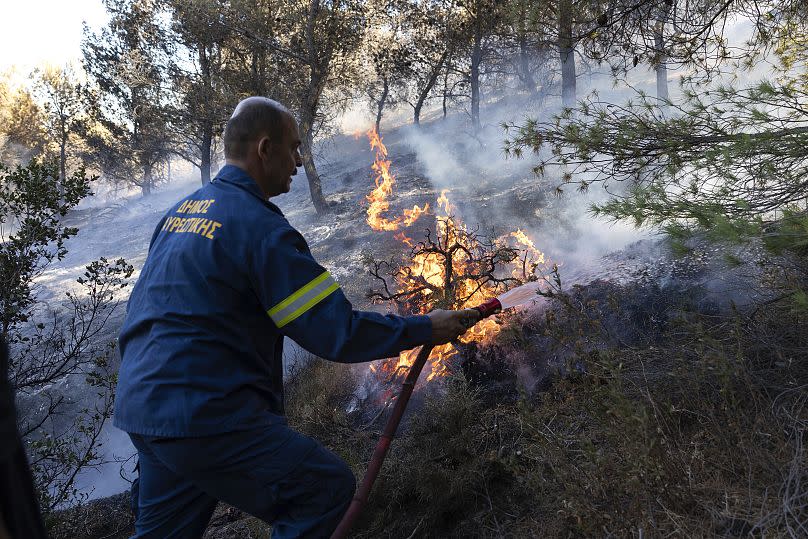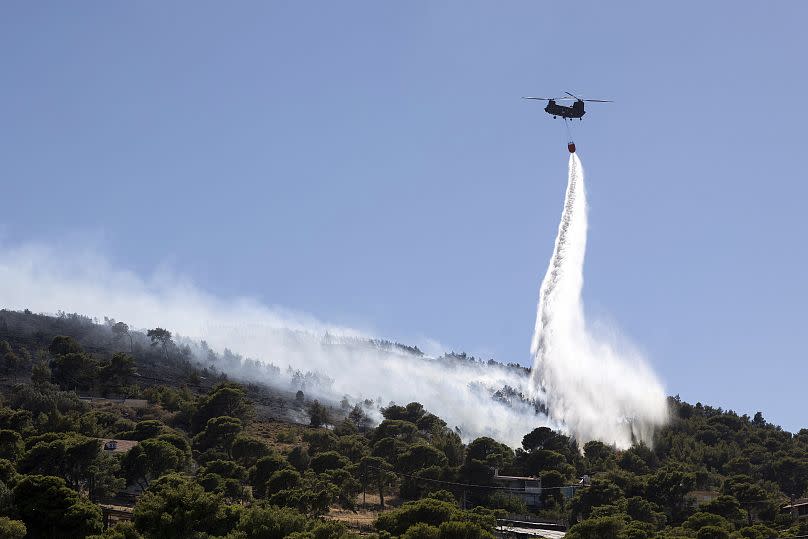Greece braces for ‘particularly dangerous’ summer as hot dry weather fuels wildfires

Firefighters battled wildfires that broke out on the eastern Aegean islands of Chios and Kos on Monday.
The blazes injured five people and Greece's prime minister has warned of a dangerous summer ahead saying the public's help was essential in limiting the impact of wildfires.
Emergency services issued evacuation orders for those in the Metohi area of western Chios on Monday morning, urging them to head to a nearby beach. By the evening, more than 140 firefighters, along with eight teams of firefighters specialising in wildfires, seven water-dropping planes and three helicopters were fighting the blaze.
Fire department spokesman Vasilis Vathrakoyiannis said two firefighters had been lightly injured, while dozens more were heading to the island by boat from the nearby island of Lesbos and from Athens.
State-run ERT television later reported that another two firefighters and a volunteer had suffered non life-threatening burns.

"The situation remains difficult in Chios, and all Civil Protection forces will make great efforts to limit it," Vathrakoyiannis said during an evening briefing.
Another fire broke out further to the south in the Aegean, on the resort island of Kos, and by late Monday had forced the evacuation of several people, including tourists from hotels, as a precaution.
‘Potentially catastrophic’: Hurricane Beryl becomes the earliest category 5 Atlantic storm on record
Switzerland’s deadly flooding shows how vulnerable it is to natural disasters, government warns
That blaze was being tackled by more than 100 firefighters, including reinforcements sent from Athens, as well as six water-dropping planes and two helicopters, Vathrakoyiannis added.
Greece braces for a 'particularly dangerous' summer
In total, Greece saw 52 wildfires breaking out in the previous 24-hour period, 44 of which were tackled in the early stages, Vathrakoyiannis said. Authorities were still battling a total of eight fires by Monday evening.
The blazes come a day after the fire department managed to tame two large forest fires near Athens that had been fanned by strong winds.
"We have had an exceptionally difficult June regarding weather conditions, with high levels of drought and unusually strong winds for this season," Prime Minister Kyriakos Mitsotakis said Monday during a Cabinet meeting.
This year's summer, he said, "is predicted to be particularly dangerous" for wildfires.

Mitsotakis said the use of drones as part of an early warning system for wildfires had been particularly useful this year and credited better coordination between authorities and volunteer firefighters for limiting the extent of fire damage so far.
"We are entering the tough core of the anti-fire period, and this will certainly not be won without the help of the public as well, particularly in the field of prevention," Mitsotakis said.
The weather is fanning the flames of Greece's fires
Hot, dry weather combined with strong winds helped fan fires in both Greece and Turkey last month. This year's summer is expected to be particularly prone to blazes following a mild, dry winter.
Europe is the fastest warming continent, according to a recent report from the UN's World Meteorological Organization and the European Union's climate agency, Copernicus. In summer that warming is focused over central and southeastern Europe and around the Mediterranean.
Arctic wildfires tear through Russia’s Far North releasing megatonnes of carbon
‘They don’t know if they’ll survive’: The Indian garbage pickers working through extreme heat
Over the past 30 to 40 years, National Observatory of Athens (NOA) research shows that the overall temperature increase in Greece exceeds 1.5C - a very high jump for such a short passage of time.

Greece is also made up of an unusual mosaic of land and sea that make it vulnerable to climate change. Higher sea surface temperatures provide more energy for fiercer and more frequent storms. Warm spells of wind blow over from Africa fuelling heatwaves.
“The existence of many islands amplifies these [climate] vulnerabilities due to their isolation, varied microclimates, and the logistical challenges in managing disasters across a dispersed archipelago,” secretary general at the Academy of Athens and climate envoy for Greece Christos Zerefos recently told Euronews Green.
"Taking into account that Greek islands host unique ecosystems and biodiversity that are highly sensitive to changes in temperature and precipitation, climate change, through increased fires and extreme weather, is the most significant threat to these ecosystems."


